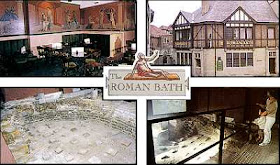We have had critique directed in our general direction to the effect that all we do is complain. While this could of course not be further from the truth, we have still decided to make the subject of today's blog update
gratitude. Gratitude for plumbing. While it's true that most of this country's plumbing at best puzzles and, at worst, horrifies us, today we acknowledge that we are grateful to be living without fear of cholera, typhus and other unpleasant plumbing-related afflictions.
 |
| People in this country are off their rocker but sometimes they get it right despite themselves |
We mentioned
John Snow the other day, and here take the opportunity to stuff your ears with some more information about this remarkable man. (We hereby also acknowledge our gratitude to
Wikipedia for making it possible for us to appear as though we know what we're talking about.)
John Snow was born in the blessed city of
York but, like many other unfortunate people, ended up living in
London. Imagine his dismay when, in 1854, he found himself in the middle of a cholera outbreak - as if life in London wasn't
already bad enough! There was no wide-ranging sewerage system in London yet (the main sewers, which are still working well-ish, were constructed
from 1859 onwards), and most people had a cesspit under their house. If you have any pretence to education you will know that one of the sources of cholera on this occasion was a pump in Broadwick Street. Turns out that the nappies of a baby who died of cholera had been discarded into a leaking cesspit in the vicinity of the pump.
John Snow's investigations and statistical calculations, although at first ignored, proved to be the first step towards the acceptance of
germ theory as opposed to the
miasma theory (though personally we find the idea of miasmically transmitted chlamydia much more amusing), and eventually led to safe drinking water in Britain.
 |
| Hard to believe that something so pretty can be so unhygienic |
Prince Albert died from typhoid, another plumbing-related disease, in 1861, and thus unwittingly became the cause of some unhealthy Victorian customs, as well as setting off a fashion for
Whitby jet. We learn from
http://www.theplumber.com/plague.html that, "Ten years later, Victoria's son, Edward, almost died from the disease. A plumber traced the contamination to the lines of a newly-installed water closet and fixed the problem. Edward, the Prince of Wales, was very grateful to the plumber. Word spread of this episode and is thought to have hastened the acceptance of the indoor water closet in England".
If you're
feeling the gratitude, buy some
Oxfam Unwrapped gifts and help people who still have no plumbing and risk contracting a lethal disease every time they drink water!
Related Reading:
Hurrah for World Toilet Day!
Oxfam Unwrapped: Build a Bog!
Historical toilets
Viking toilets
After all this, can you believe that there are still people who don't wash their hands after they've been to the toilet?
Victorian Servants Have Taken over the Book Club
























